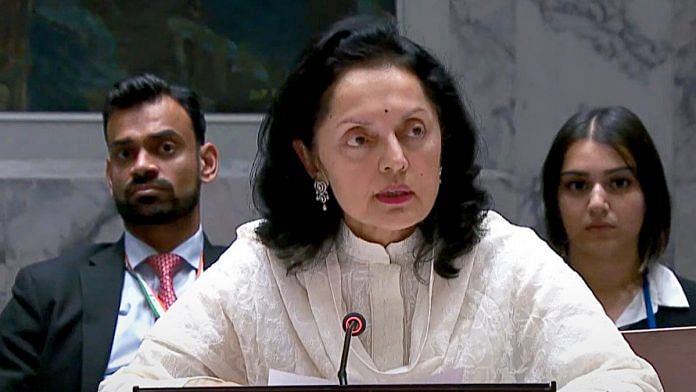New Delhi: The fact that India has been a “victim of cross-border terrorism” needs to be told to the world so that the international community pays attention to this matter, Ruchira Kamboj, India’s Permanent Representative to the UN in New York told ThePrint.
In an exclusive interview discussing the special meeting of the UN Security Council (UNSC) Counter-Terrorism Committee in India last month, Kamboj said, “It is important that we bring out our story of being a victim of cross-border terrorism in an impactful manner, in front of the international community so that it pays equal attention to our concerns.”
Kamboj, who is also currently the chair of the committee, added that the special meeting which took place in Mumbai and Delhi, had a particular significance as the council paid homage to the victims of the 26/11 Mumbai attacks and witnessed the testimonies of the victims and survivors.
“They touched the nerves of many council members through sharing the horrors of their experience as well as highlighting their resilience to combat the impact of terrorist attacks,” she said from New York.
Also Read: ’Politically motivated’: India slams China for blocking UNSC bid to list JeM dy chief as terrorist
‘FATF has done good work’
When asked whether the issue of Pakistan exiting the ‘grey list’ of the Financial Action Task Force — a Paris-based terror financing watchdog — was raised at the special UNSC meeting, Kamboj said, “The meeting should be seen as an endeavor of the UNSC to deal with — the use of new and emerging technologies for terrorist purposes, irrespective of regions or jurisdictions, to highlight the need for enhancing accountability of member states in combating the threat of terrorism through adopting global best practices and AML/CFT (anti-money laundering and terrorist financing) and standards.”
She added, “The FATF has done good work in this regard, and the Delhi Declaration takes note of the FATF’s contribution, particularly in addressing the threat of virtual currencies and new payment methods.”
The Delhi Declaration was adopted after the UN’s special meeting where the member countries lauded FATF’s work concerning global implementation of counter-terrorist financing measures.
“The FATF evaluation and classification of jurisdictions has played a role in obligating member states to take verifiable measures to stem the terror financing threat arising out of their territories. The Committee has resolved to continue its cooperation with FATF, and benefit from their expertise when undertaking country visits and assessments,” said Kamboj.
Pakistan exited the FATF’s ‘grey list’ in October after a span of four years. The FATF puts a country under the so-called ‘grey list’ to monitor the country’s financial system and to check if it is encouraging money laundering and financing terror outfits.
Kamboj also highlighted that despite the inhibitions of some delegations in supporting the work of FATF, the (UN special) meeting acknowledged their work in countering the financing of terrorism.
It also emphasised the need for adoption by member states of FATF recommendations on suppressing misuse of new payment methods, including value stored and prepaid cards, virtual assets, cryptocurrencies, crowdfunding platforms by terrorist groups for raising funds, she added.
Also Read: As terror watchdog FATF considers reprieve for Pakistan, Jaish-e-Mohammed is expanding seminary
‘Pity’ that no common definition of terrorism formulated
India has been pushing for the early finalisation of the Comprehensive Convention on International Terrorism (CCIT), which envisages a common global template to counter terrorism.
The adoption of the CCIT under the UN was first proposed by India in 1996, but it has been in limbo ever since due to opposition from several countries on some of the provisions laid out in the convention.
India has put special focus on the issue of cross-border terrorism. Ever since India became one of the non-permanent members of the UNSC in 2021, it has been batting for the convention’s adoption.
“The CCIT is aimed to provide a comprehensive but an objective approach on the issue of counter terrorism. It is a pity that even after decades of facing the threat of terrorism, we cannot agree to a common definition of terrorism,” stressed Kamboj.
She added that the lack of a common definition of terrorism has been exploited by opportunistic states who seek to benefit from this ambiguity “by justifying their laxity to take counterterrorism measures or even support certain acts of terrorism”.
The envoy, however, said, “CCIT is a member state-driven process, and as such will be time-consuming. What would be important, is that we continue to raise awareness on this issue, and work towards building consensus. The Delhi Declaration takes note of efforts of the member states towards achieving consensus on this issue.”
The Delhi Declaration takes into account the threat of use of new and emerging technologies by terrorists and terrorist groups, holistically, including the threat of cross border terrorism, though without explicitly mentioning this, said Kamboj.
She added, “However, no one should be under the impression that there is any exclusivity in dealing with this threat. Indeed, the Delhi Declaration clearly warns the member states to refrain from providing any form of support, active of passive to terrorists and terrorist groups, and urges them to fulfil their international counterterrorism obligations.”
(Edited by Theres Sudeep)
Also Read: Coimbatore ‘suicide bomber’ had taken ISIS oath, ‘planned to attack temple’, claim investigators



